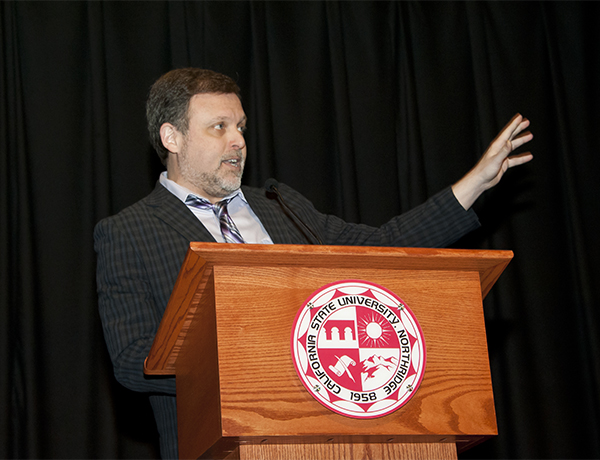Anti-racist Educator Calls on the ‘Privileged’ to Break the Cycle of Ignorance and Discrimination

Anti-racism activist and author Tim Wise spoke to a packed house at California State University, Northridge on Dec. 2 about white privilege and racism. Photo by David J. Hawkins.
Anti-racism activist and author Tim Wise spoke to a packed house at California State University, Northridge on Dec. 2 about white privilege and racism.
Wise, a renowned public speaker and author of six books, including White Like Me: Reflections on Race from a Privileged Son, was the keynote speaker at an event organized by CSUN’s undergraduate research program, BUILD PODER (Building Infrastructure Leading to Diversity | Promoting Opportunities for Diversity in Education and Research).
The lecture, themed, “Colorblind: The Rise of Post-Racial Politics and the Retreat from Racial Equity,” gave attendees an opportunity to openly discuss the racial divide that Wise says is still very prevalent today.
“We have to address our unwillingness as a people … white folks in particular, to be honest about our history and its effect on the present,” said Wise, calling the U.S. a “Snapchat nation.” He said whites are “ahistorical” and only willing to revisit the past if it makes them “feel good.”
He said whites have the privilege of being oblivious and ignorant about issues of racial injustice and inequality, and cited a range of issues, including high unemployment rates among blacks and Latinos (including those with college educations), police brutality and high rates of incarceration.
“If we could just learn to listen to people of color the first time they bring up issues of racial injustice,” said Wise, who expanded his lecture to include discrimination based on gender, gender identity, religion and ableism.
“White people think they know more about racism than blacks. We didn’t take the class,” Wise said. “Men think they know more about sexism, patriarchy and rape culture than women.”
He said he did not blame whites for this system because it is “systemically ingrained ignorance.”
“It’s only your fault for continuing to not know even when the evidence has been presented,” Wise said. However, he said whites must be “humble” enough to acknowledge they’ve been misled.

 experience
experience